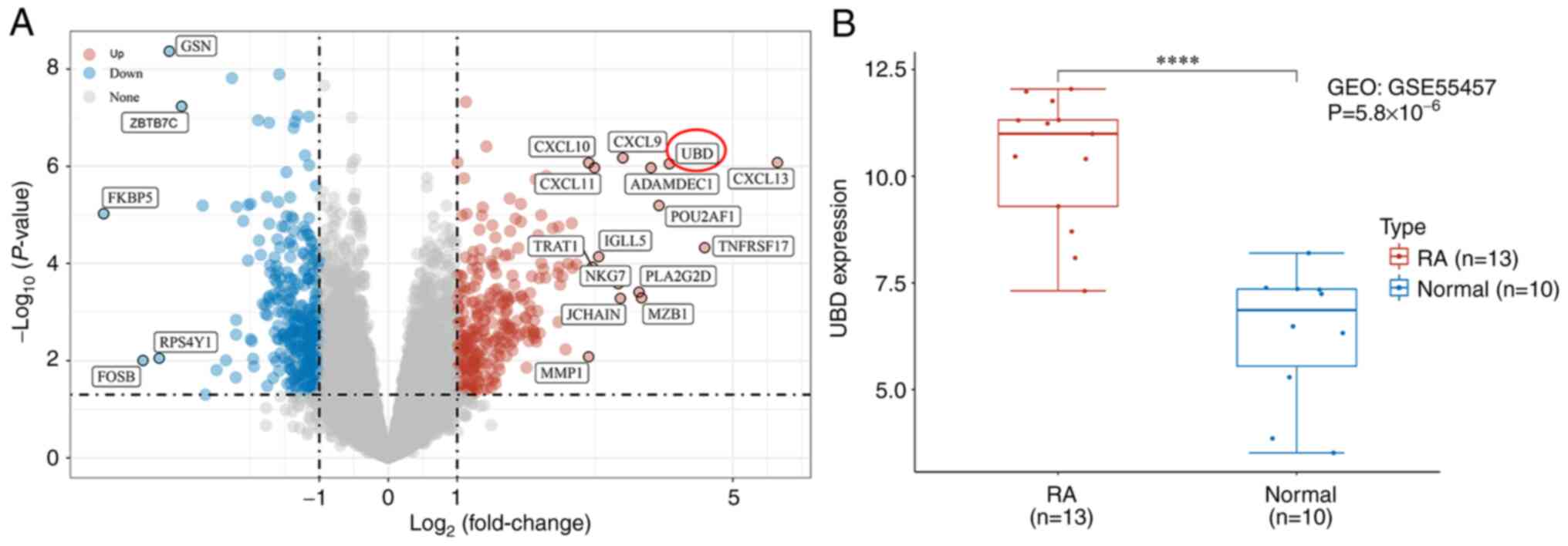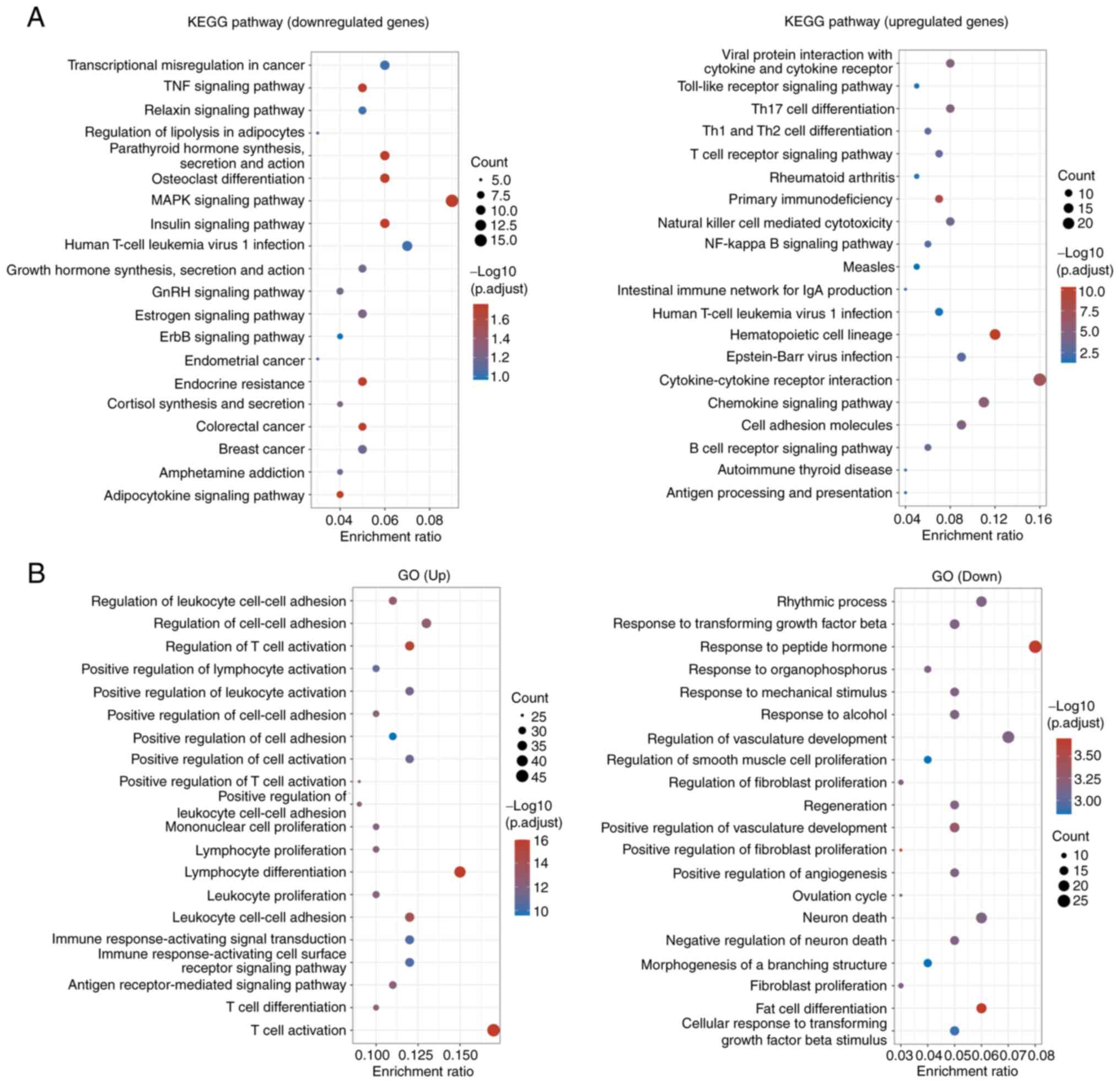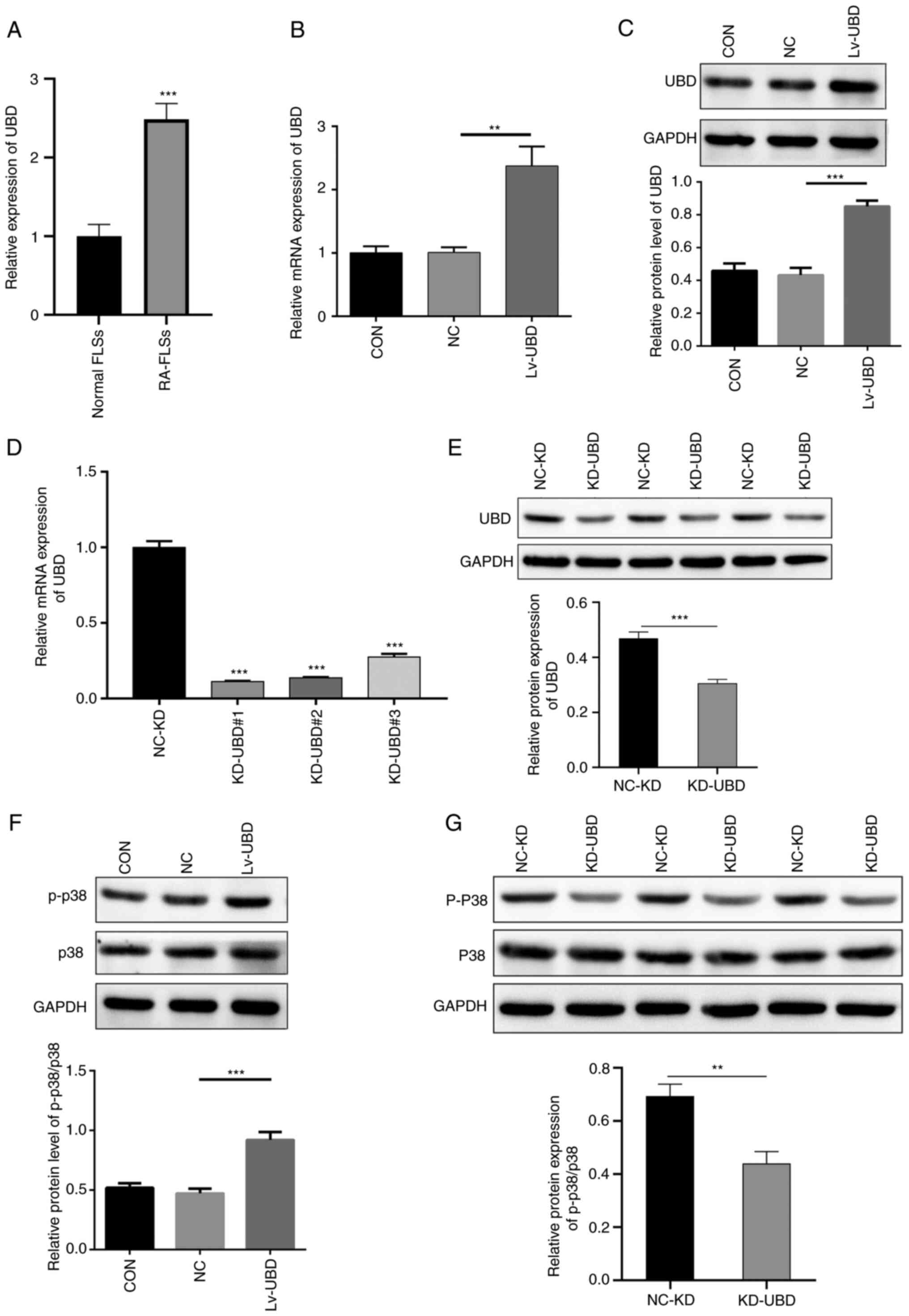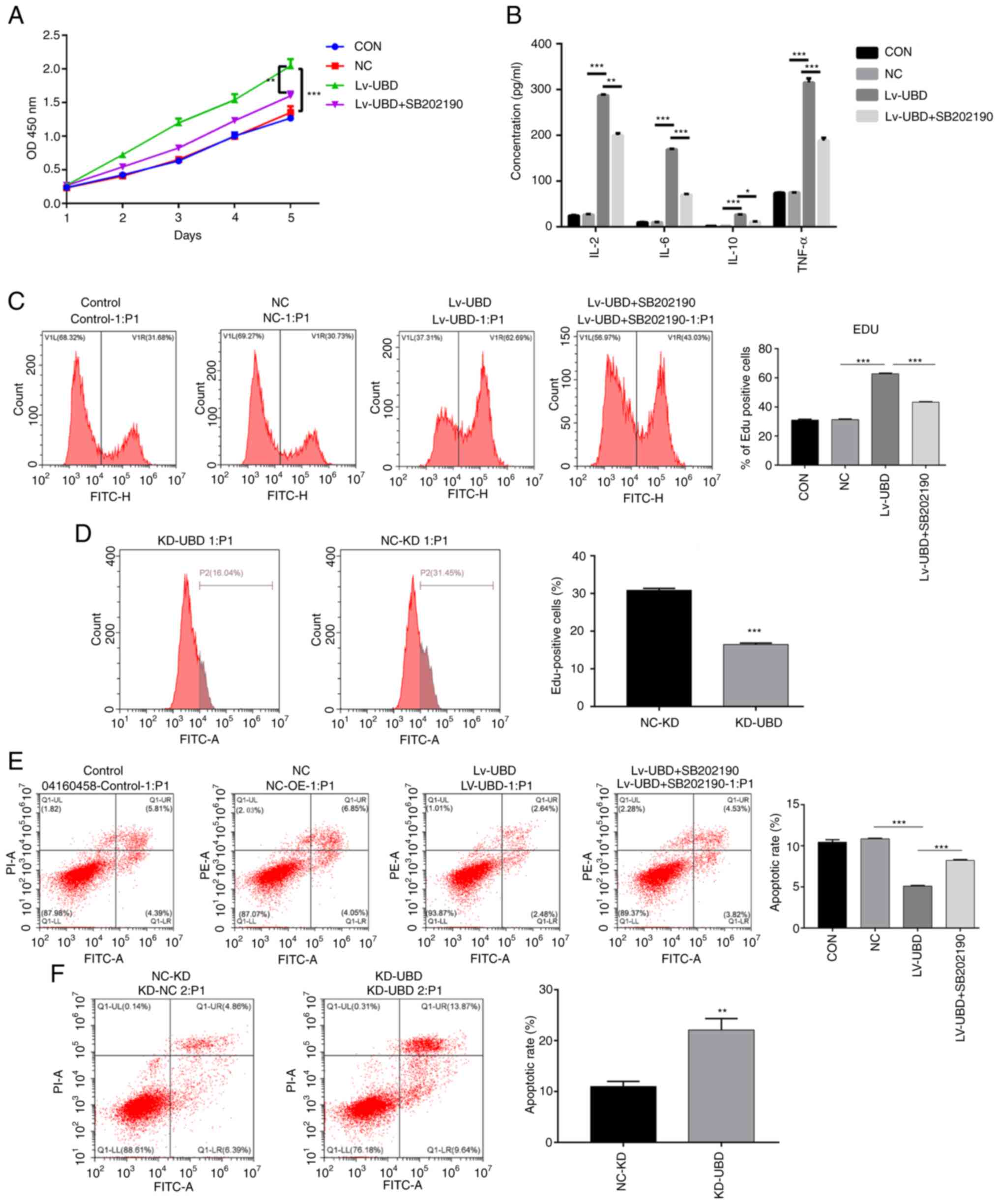|
1
|
O'Neil LJ, Barrera-Vargas A,
Sandoval-Heglund D, Merayo-Chalico J, Aguirre-Aguilar E, Aponte AM,
Ruiz-Perdomo Y, Gucek M, El-Gabalawy H, Fox DA, et al:
Neutrophil-mediated carbamylation promotes articular damage in
rheumatoid arthritis. Sci Adv. 6:eabd26882020. View Article : Google Scholar : PubMed/NCBI
|
|
2
|
Smith MH and Berman JR: What is rheumatoid
arthritis? JAMA. 327:11942022. View Article : Google Scholar : PubMed/NCBI
|
|
3
|
Lee SH, Kwon JY, Kim SY, Jung K and Cho
ML: Interferon-gamma regulates inflammatory cell death by targeting
necroptosis in experimental autoimmune arthritis. Sci Rep.
7:101332017. View Article : Google Scholar : PubMed/NCBI
|
|
4
|
Shah N, Jadidi S and Bajaj P: Correction:
A review of non-surgical pain management in osteoarthritis. Cureus.
13:c452021.PubMed/NCBI
|
|
5
|
Mekic M and Hadzigrahic E: Anti-cyclic
citrullinated peptide antibody as a predictor of rheumathoid
arthritis complications. Med Arch. 74:183–186. 2020. View Article : Google Scholar : PubMed/NCBI
|
|
6
|
Zhou Y, Abraham S, Andre P, Edelstein LC,
Shaw CA, Dangelmaier CA, Tsygankov AY, Kunapuli SP, Bray PF and
McKenzie SE: Anti-miR-148a regulates platelet FcγRIIA signaling and
decreases thrombosis in vivo in mice. Blood. 126:2871–2881. 2015.
View Article : Google Scholar : PubMed/NCBI
|
|
7
|
Patin EC, Thompson A and Orr SJ: Pattern
recognition receptors in fungal immunity. Semin Cell Dev Biol.
89:24–33. 2019. View Article : Google Scholar : PubMed/NCBI
|
|
8
|
Schmid E, Bhandaru M, Nurbaeva MK, Yang W,
Szteyn K, Russo A, Leibrock C, Tyan L, Pearce D, Shumilina E and
Lang F: SGK3 regulates Ca(2+) entry and migration of dendritic
cells. Cell Physiol Biochem. 30:1423–1435. 2012. View Article : Google Scholar : PubMed/NCBI
|
|
9
|
Jeon JH, Lee BC, Kim D, Cho D and Kim TS:
Hydrophilic astragalin galactoside induces T helper type 1-mediated
immune responses via dendritic cells. Int J Mol Sci. 19:31202018.
View Article : Google Scholar : PubMed/NCBI
|
|
10
|
Kuwabara T, Ishikawa F, Kondo M and
Kakiuchi T: The role of IL-17 and related cytokines in inflammatory
autoimmune diseases. Mediators Inflamm. 2017:39080612017.
View Article : Google Scholar : PubMed/NCBI
|
|
11
|
Wu S, Wang Y, Zhang J, Han B, Wang B, Gao
W, Zhang N, Zhang C, Yan F and Li Z: Efficacy and safety of
rituximab for systemic lupus erythematosus treatment: A
meta-analysis. Afr Health Sci. 20:871–884. 2020. View Article : Google Scholar : PubMed/NCBI
|
|
12
|
Wang F, Shi WX, Chen J, He K and Fang W:
Clinical therapeutic effects of combined diacerein and glucosamine
in the treatment of osteoarthritis: A protocol for systematic
review and meta-analysis. Medicine (Baltimore). 100:e275832021.
View Article : Google Scholar : PubMed/NCBI
|
|
13
|
Murata K, Furu M, Yoshitomi H, Ishikawa M,
Shibuya H, Hashimoto M, Imura Y, Fujii T, Ito H, Mimori T and
Matsuda S: Comprehensive microRNA analysis identifies miR-24 and
miR-125a-5p as plasma biomarkers for rheumatoid arthritis. PLoS
One. 8:e691182013. View Article : Google Scholar : PubMed/NCBI
|
|
14
|
Donlin LT: Inching closer to precision
treatment for rheumatoid arthritis. Nat Med. 28:1129–1131. 2022.
View Article : Google Scholar : PubMed/NCBI
|
|
15
|
Lourenzi FM, Jones A, Pereira DF, Santos
JHCAD, Furtado RNV and Natour J: Effectiveness of an overall
progressive resistance strength program for improving the
functional capacity of patients with rheumatoid arthritis: A
randomized controlled trial. Clin Rehabil. 31:1482–1491. 2017.
View Article : Google Scholar : PubMed/NCBI
|
|
16
|
Aichem A and Groettrup M: The
ubiquitin-like modifier FAT10 in cancer development. Int J Biochem
Cell Biol. 79:451–461. 2016. View Article : Google Scholar : PubMed/NCBI
|
|
17
|
Raasi S, Schmidtke G, de Giuli R and
Groettrup M: A ubiquitin-like protein which is synergistically
inducible by interferon-gamma and tumor necrosis factor-alpha. Eur
J Immunol. 29:4030–4036. 1999. View Article : Google Scholar : PubMed/NCBI
|
|
18
|
Liu YC, Pan J, Zhang C, Fan W, Collinge M,
Bender JR and Weissman SM: A MHC-encoded ubiquitin-like protein
(FAT10) binds noncovalently to the spindle assembly checkpoint
protein MAD2. Proc Natl Acad Sci USA. 96:4313–4318. 1999.
View Article : Google Scholar : PubMed/NCBI
|
|
19
|
Battaglia A, Fossati M, Buzzonetti A,
Scambia G and Fattorossi A: A robust immune system conditions the
response to abagovomab (anti-idiotypic monoclonal antibody
mimicking the CA125 protein) vaccination in ovarian cancer
patients. Immunol Lett. 191:35–39. 2017. View Article : Google Scholar : PubMed/NCBI
|
|
20
|
Tanyi JL and George E: Personalized
vaccination against ovarian cancer: What are the possibilities?
Expert Rev Vaccines. 17:955–958. 2018. View Article : Google Scholar : PubMed/NCBI
|
|
21
|
Paijens ST, Leffers N, Daemen T, Helfrich
W, Boezen HM, Cohlen BJ, Melief CJ, de Bruyn M and Nijman HW:
Antigen-specific active immunotherapy for ovarian cancer. Cochrane
Database Syst Rev. 9:CD0072872018.PubMed/NCBI
|
|
22
|
Kalli KR, Block MS, Kasi PM, Erskine CL,
Hobday TJ, Dietz A, Padley D, Gustafson MP, Shreeder B,
Puglisi-Knutson D, et al: Folate receptor alpha peptide vaccine
generates immunity in breast and ovarian cancer patients. Clin
Cancer Res. 24:3014–3025. 2018. View Article : Google Scholar : PubMed/NCBI
|
|
23
|
Han T, Liu Z, Li H, Xie W, Zhang R, Zhu L,
Guo F, Han Y, Sheng Y and Xie X: High expression of UBD correlates
with epirubicin resistance and indicates poor prognosis in
triple-negative breast cancer. Onco Targets Ther. 8:1643–1649.
2015.PubMed/NCBI
|
|
24
|
Yan DW, Li DW, Yang YX, Xia J, Wang XL,
Zhou CZ, Fan JW, Wen YG, Sun HC, Wang Q, et al: Ubiquitin D is
correlated with colon cancer progression and predicts recurrence
for stage II–III disease after curative surgery. Br J Cancer.
103:961–969. 2010. View Article : Google Scholar : PubMed/NCBI
|
|
25
|
Bottini N and Firestein GS: Duality of
fibroblast-like synoviocytes in RA: Passive responders and
imprinted aggressors. Nat Rev Rheumatol. 9:24–33. 2013. View Article : Google Scholar : PubMed/NCBI
|
|
26
|
Bartok B and Firestein GS: Fibroblast-like
synoviocytes: Key effector cells in rheumatoid arthritis. Immunol
Rev. 233:233–255. 2010. View Article : Google Scholar : PubMed/NCBI
|
|
27
|
You R, Liu S and Tan J: Screening and
identification of osteoarthritis related differential genes and
construction of a risk prognosis model based on bioinformatics
analysis. Ann Transl Med. 10:4442022. View Article : Google Scholar : PubMed/NCBI
|
|
28
|
Huang WC, Liou CJ, Shen SC, Hu S, Hsiao CY
and Wu SJ: Luteolin attenuates IL-1β-induced THP-1 adhesion to
ARPE-19 cells via suppression of NF-κB and MAPK pathways. Mediators
Inflamm. 2020:94213402020. View Article : Google Scholar : PubMed/NCBI
|
|
29
|
Yang L, Yang H, Chu Y, Song Y, Ding L, Zhu
B, Zhai W, Wang X, Kuang Y, Ren F, et al: CREPT is required for
murine stem cell maintenance during intestinal regeneration. Nat
Commun. 12:2702021. View Article : Google Scholar : PubMed/NCBI
|
|
30
|
Livak KJ and Schmittgen TD: Analysis of
relative gene expression data using real-time quantitative PCR and
the 2(−Delta Delta C(T)) method. Methods. 25:402–408. 2001.
View Article : Google Scholar : PubMed/NCBI
|
|
31
|
Liang X, Zhu W, Lv Z and Zou Q: Molecular
computing and bioinformatics. Molecules. 24:23582019. View Article : Google Scholar : PubMed/NCBI
|
|
32
|
Pandya JM, Lundell AC, Andersson K,
Nordström I, Theander E and Rudin A: Blood chemokine profile in
untreated early rheumatoid arthritis: CXCL10 as a disease activity
marker. Arthritis Res Ther. 19:202017. View Article : Google Scholar : PubMed/NCBI
|
|
33
|
Tsai CH, Chen CJ, Gong CL, Liu SC, Chen
PC, Huang CC, Hu SL, Wang SW and Tang CH: CXCL13/CXCR5 axis
facilitates endothelial progenitor cell homing and angiogenesis
during rheumatoid arthritis progression. Cell Death Dis.
12:8462021. View Article : Google Scholar : PubMed/NCBI
|
|
34
|
Zhong H, Xu LL, Bai MX and Su Y: Effect of
chemokines CXCL9 and CXCL10 on bone erosion in patients with
rheumatoid arthritis. Beijing Da Xue Xue Bao Yi Xue Ban.
53:1026–1031. 2021.(In Chinese). PubMed/NCBI
|
|
35
|
Schmidtke G, Kalveram B and Groettrup M:
Degradation of FAT10 by the 26S proteasome is independent of
ubiquitylation but relies on NUB1L. FEBS Lett. 583:591–594. 2009.
View Article : Google Scholar : PubMed/NCBI
|
|
36
|
Xiang S, Shao X, Cao J, Yang B, He Q and
Ying M: FAT10: Function and relationship with cancer. Curr Mol
Pharmacol. 13:182–191. 2020. View Article : Google Scholar : PubMed/NCBI
|
|
37
|
Lee CGL, Ren J, Cheong ISY, Ban KHK, Ooi
LLPJ, Yong Tan SY, Kan A, Nuchprayoon I, Jin R, Lee KH, et al:
Expression of the FAT10 gene is highly upregulated in
hepatocellular carcinoma and other gastrointestinal and
gynecological cancers. Oncogene. 22:2592–2603. 2003. View Article : Google Scholar : PubMed/NCBI
|
|
38
|
Theng SS, Wang W, Mah WC, Chan C, Zhuo J,
Gao Y, Qin H, Lim L, Chong SS, Song J and Lee CG: Disruption of
FAT10-MAD2 binding inhibits tumor progression. Proc Natl Acad Sci
USA. 111:E5282–E5291. 2014. View Article : Google Scholar : PubMed/NCBI
|
|
39
|
Su H, Qin M, Liu Q, Jin B, Shi X and Xiang
Z: Ubiquitin-like protein UBD promotes cell proliferation in
colorectal cancer by facilitating p53 degradation. Front Oncol.
11:6913472021. View Article : Google Scholar : PubMed/NCBI
|
|
40
|
Buerger S, Herrmann VL, Mundt S, Trautwein
N, Groettrup M and Basler M: The ubiquitin-like modifier FAT10 is
selectively expressed in medullary thymic epithelial cells and
modifies T cell selection. J Immunol. 195:4106–4116. 2015.
View Article : Google Scholar : PubMed/NCBI
|
|
41
|
Xiao Y, Diao Q, Liang Y, Peng Y and Zeng
K: MicroRNA-24-1-5p promotes malignant melanoma cell autophagy and
apoptosis via regulating ubiquitin D. Mol Med Rep. 16:8448–8454.
2017. View Article : Google Scholar : PubMed/NCBI
|
|
42
|
Taniai E, Yafune A, Hayashi H, Itahashi M,
Hara-Kudo Y, Suzuki K, Mitsumori K and Shibutani M: Aberrant
activation of ubiquitin D at G2 phase and apoptosis by carcinogens
that evoke cell proliferation after 28-day administration in rats.
J Toxicol Sci. 37:1093–1111. 2012. View Article : Google Scholar : PubMed/NCBI
|
|
43
|
Brozzi F, Gerlo S, Grieco FA, Juusola M,
Balhuizen A, Lievens S, Gysemans C, Bugliani M, Mathieu C,
Marchetti P, et al: Ubiquitin D regulates IRE1α/c-Jun N-terminal
kinase (JNK) protein-dependent apoptosis in pancreatic beta cells.
J Biol Chem. 291:12040–12056. 2016. View Article : Google Scholar : PubMed/NCBI
|
|
44
|
Wang H, Tu S, Yang S, Shen P, Huang Y, Ba
X, Lin W, Huang Y, Wang Y, Qin K and Chen Z: Berberine modulates
LPA function to inhibit the proliferation and inflammation of
FLS-RA via p38/ERK MAPK pathway mediated by LPA1. Evid
Based Complement Alternat Med. 2019:25802072019. View Article : Google Scholar : PubMed/NCBI
|
|
45
|
Graßhoff H, Comdühr S, Monne LR, Müller A,
Lamprecht P, Riemekasten G and Humrich JY: Low-dose IL-2 therapy in
autoimmune and rheumatic diseases. Front Immunol. 12:6484082021.
View Article : Google Scholar : PubMed/NCBI
|
|
46
|
Lauper K, Ludici M, Mongin D, Bergstra SA,
Choquette D, Codreanu C, Cordtz R, De Cock D, Dreyer L, Elkayam O,
et al: Effectiveness of TNF-inhibitors, abatacept, IL6-inhibitors
and JAK-inhibitors in 31 846 patients with rheumatoid arthritis in
19 registers from the ‘JAK-pot’ collaboration. Ann Rheum Dis.
81:1358–1366. 2022. View Article : Google Scholar : PubMed/NCBI
|
|
47
|
Wang J, Liu J, Wen JT and Wang X:
Correlation between circRNA0003353 in peripheral blood mononuclear
cells and immune inflammation in rheumatoid arthritis patients with
damp heat obstruction syndrome. Sichuan Da Xue Xue Bao Yi Xue Ban.
53:437–443. 2022.(In Chinese). PubMed/NCBI
|
|
48
|
Alturaiki W, Alhamad A, Alturaiqy M, Mir
SA, Iqbal D, Bin Dukhyil AA, Alaidarous M, Alshehri B, Alsagaby SA,
Almalki SG, et al: Assessment of IL-1β, IL-6, TNF-α, IL-8, and CCL
5 levels in newly diagnosed Saudi patients with rheumatoid
arthritis. Int J Rheum Dis. 25:1013–1019. 2022. View Article : Google Scholar : PubMed/NCBI
|
|
49
|
van Delft MAM and Huizinga TWJ: An
overview of autoantibodies in rheumatoid arthritis. J Autoimmun.
110:1023922020. View Article : Google Scholar : PubMed/NCBI
|
|
50
|
Song A, Wang Y, Jiang F, Yan E, Zhou J, Ye
J, Zhang H, Ding X, Li G, Wu Y, et al: Ubiquitin D promotes
progression of oral squamous cell carcinoma via NF-kappa B
signaling. Mol Cells. 44:468–480. 2021. View Article : Google Scholar : PubMed/NCBI
|
|
51
|
Yuan R, Wang K, Hu J, Yan C, Li M, Yu X,
Liu X, Lei J, Guo W, Wu L, et al: Ubiquitin-like protein FAT10
promotes the invasion and metastasis of hepatocellular carcinoma by
modifying β-catenin degradation. Cancer Res. 74:5287–5300. 2014.
View Article : Google Scholar : PubMed/NCBI
|


















